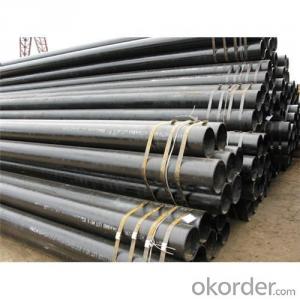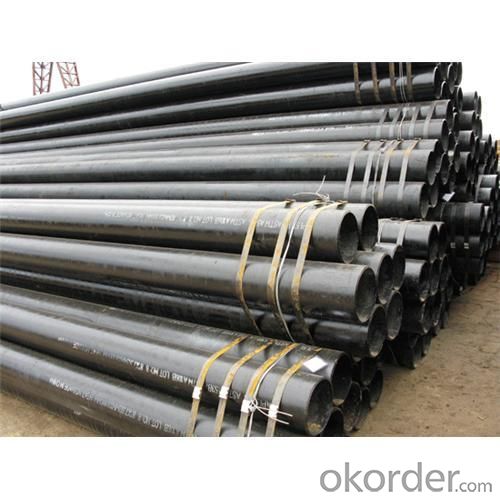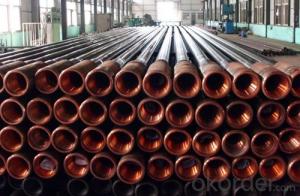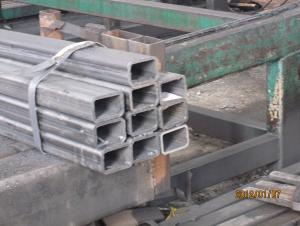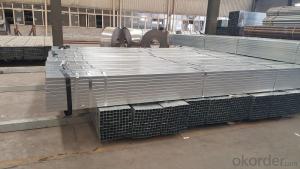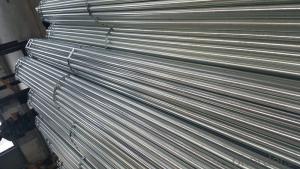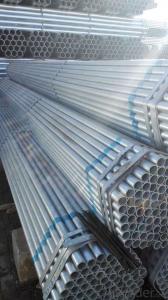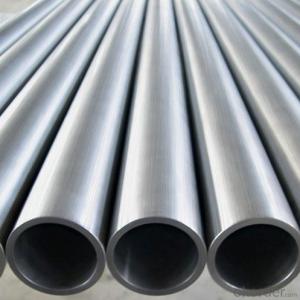Water Pipe Wteel Linepipe Steel Water Linepipe Steel Linepipe for Conveying Water
- Loading Port:
- Tianjin
- Payment Terms:
- TT OR LC
- Min Order Qty:
- 25 m.t.
- Supply Capability:
- 7000 m.t./month
OKorder Service Pledge
OKorder Financial Service
You Might Also Like
1、Structure of Steel water linePipe API SPEC 5CT:
Steelwater linePipe is to be used for conveying gas, water, and petroleum and natural gas industries,etc. And used for structural steel pies purpose. As the manufacturing process does not include any welding, seamless pipes are perceived to be stronger and more reliable. Historically seamless pipe was regarded as withstanding pressure better than other types, and was often more easily available than welded pipe.
2、Main Features of Steel water linePipe API SPEC 5CT:
• High manufacturing accuracy
• High strength
• Small inertia resistance
• Strong heat dissipation ability
• Good visual effect
• Reasonable price
3、Steel water linePipe API SPEC 5CT: Specification:
Standard | GB, DIN, ASTM ASTM A106-2006, ASTM A53-2007 |
Grade | 10#-45#, 16Mn 10#, 20#, 45#, 16Mn |
Thickness | 8 - 33 mm |
Section Shape | Round |
Outer Diameter | 133 - 219 mm |
Place of Origin | Shandong, China (Mainland) |
Secondary Or Not | Non-secondary |
Application | Hydraulic Pipe |
Technique | Cold Drawn |
Certification | API |
Surface Treatment | factory state or painted black |
Special Pipe | API Pipe |
Alloy Or Not | Non-alloy |
Length | 5-12M |
Outer Diameter | 21.3-610mm |
Grade | 20#, 45#, Q345, API J55, API K55, API L80, API N80, API P110, A53B |
Standard | ASME, ASTM |
1) Material:20#(ASTM A 106/A53 GRB.API5LGRB,GB),45#,16Mn,10#.
2) Specification range:OD:21.3-610mm,WT:6-70mm,length:6-12m or according to the requirement of clients.
3) Excutive standards:GB,ASME API5L.ASTM A 106/A53,Despite of the above standards,we can also supply seamless steel pipe with standard of DIN,JIS,and so on,and also develop new products according to the requirements of our clients!
4) Surface:black lacquered,varnish coating or galvanized.
5) Ends:Beveled or square cut,plastic capped,painted.
6) Packing:bundles wrapped with strong steel strip,seaworthy packing.
4、Packaging & Delivery
Packaging Details: | seaworthy package,bundles wrapped with strong steel strip |
Delivery Detail: | 15-30days after received 30%TT |
5、FAQ of Steel water linePipe API SPEC 5CT:
①How is the quality of your products?
Our products are manufactured strictly according to national and internaional standard, and we take a test
on every pipe before delivered out. If you want see our quality certifications and all kinds of testing report, please just ask us for it.
Guaranteed: If products’ quality don’t accord to discription as we give or the promise before you place order, we promise 100% refund.
②How about price?
Yes, we are factory and be able to give you lowest price below market one, and we have a policy that “ for saving time and absolutely honest business attitude, we quote as lowest as possible for any customer, and discount can be given according to quantity”,if you like bargain and factory price is not low enough as you think, just don’t waste your time.Please trust the quotation we would give you, it is professional one.
③Why should you chose us?
Chose happens because of quality, then price, We can give you both.Additionally, we can also offer professional products inquiry, products knowledge train(for agents), smooth goods delivery, exellent customer solution proposals.Our service formula: good quality+good price+good service=customer’s trust
SGS test is available, customer inspection before shipping is welcome, third party inspection is no problem.
6、 Steel water linePipe API SPEC 5CT: Images:
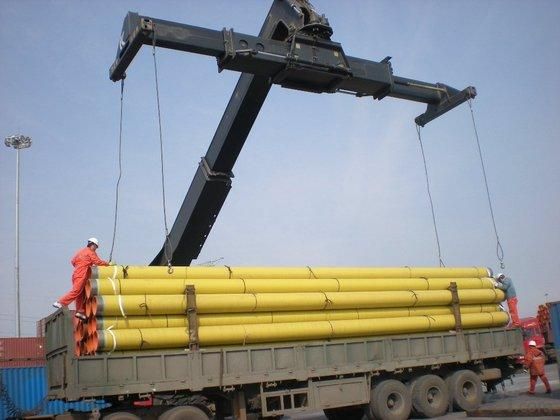
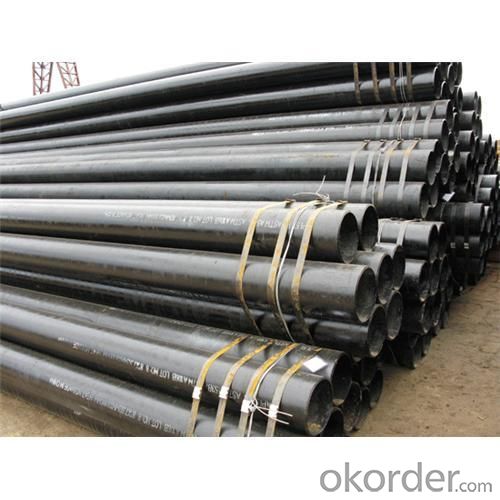
- Q: Can steel pipes be recycled?
- Yes, steel pipes can be recycled. Steel is a highly recyclable material and can be used to create new steel products, including pipes, through processes like melting and reshaping. This helps to conserve natural resources, reduce energy consumption, and minimize waste.
- Q: What are the factors that affect the price of steel pipes?
- The factors that affect the price of steel pipes include the cost of raw materials, such as iron ore and coal, as well as the demand and supply dynamics in the steel industry. Other factors include labor costs, energy prices, transportation costs, and any taxes or tariffs imposed on steel imports. Additionally, market conditions, global economic trends, and government regulations can also influence the price of steel pipes.
- Q: How are steel pipes protected during transportation and storage?
- Steel pipes are typically protected during transportation and storage through various measures such as corrosion prevention coatings, wrapping them with protective materials like plastic or rubber, and securing them properly to prevent any damage or movement.
- Q: Can steel pipes be used for conveying abrasive materials?
- Yes, steel pipes can be used for conveying abrasive materials. Steel pipes are known for their durability and strength, making them suitable for handling abrasive substances without significant wear or damage. Additionally, steel pipes can be coated or lined with materials such as rubber or ceramic to provide extra protection against abrasion and extend their lifespan.
- Q: How are steel pipes protected against abrasive wear?
- Steel pipes are protected against abrasive wear through various methods such as lining the interior of the pipes with abrasion-resistant materials, applying protective coatings on the pipe surface, or using ceramic tiles or liners. These measures help minimize the effects of friction and abrasion, ensuring the longevity and durability of the steel pipes.
- Q: Can steel pipes be used for petrochemical plants?
- Yes, steel pipes can be used for petrochemical plants. Steel pipes are commonly used in petrochemical plants due to their high strength, durability, and resistance to corrosion. They can handle high-pressure and high-temperature applications, making them suitable for transporting various chemicals and gases in petrochemical processes.
- Q: Is the diameter of the steel tube indicated by the outer diameter by the wall thickness or by the inside diameter by the wall thickness?
- For seamless steel pipes or nonferrous metal pipes, the outer diameter * wall thickness shall be marked".For example, 108 x 4 phi, Phi can be omitted. Some steel tubes in China, ISO and Japan adopt wall thickness to indicate the thickness of steel pipe. The method for the specification of such steel tubes is pipe outer diameter * wall thickness. For example, Phi 60.5 * 3.8.
- Q: What's the difference between the fastener type steel pipe scaffold, the floor type steel pipe scaffold and the overhanging type steel pipe scaffold?
- Butt fastener: used for connecting two steel pipe joints.The base and the pad: is set up in the bottom of the pedestal pole, pay attention to the distinction between base and the base plate, usually with steel plate and welded steel pipe, base usually put on a backing plate, and the plate can be wood can also be plate.The foot board (see the diagram below), safety net (no explanation, this is very simple).
- Q: What are the different methods of cutting steel pipes?
- The different methods of cutting steel pipes include using a hacksaw, pipe cutter, angle grinder with a cutting disc, reciprocating saw, plasma cutter, or oxy-fuel torch.
- Q: What is the typical lifespan of steel pipes?
- The lifespan of steel pipes can differ based on several factors, including the steel quality, environmental conditions, and pipe maintenance and usage. On average, steel pipes typically last between 50 and 100 years. However, by installing them correctly, conducting regular inspections, and maintaining them appropriately, steel pipes can often surpass this lifespan and offer dependable service for many decades. It is worth noting that corrosion, erosion, and external damage can affect the longevity of steel pipes. Therefore, it is essential to implement preventive measures and carry out necessary repairs to guarantee their durability.
Send your message to us
Water Pipe Wteel Linepipe Steel Water Linepipe Steel Linepipe for Conveying Water
- Loading Port:
- Tianjin
- Payment Terms:
- TT OR LC
- Min Order Qty:
- 25 m.t.
- Supply Capability:
- 7000 m.t./month
OKorder Service Pledge
OKorder Financial Service
Similar products
Hot products
Hot Searches
Related keywords
